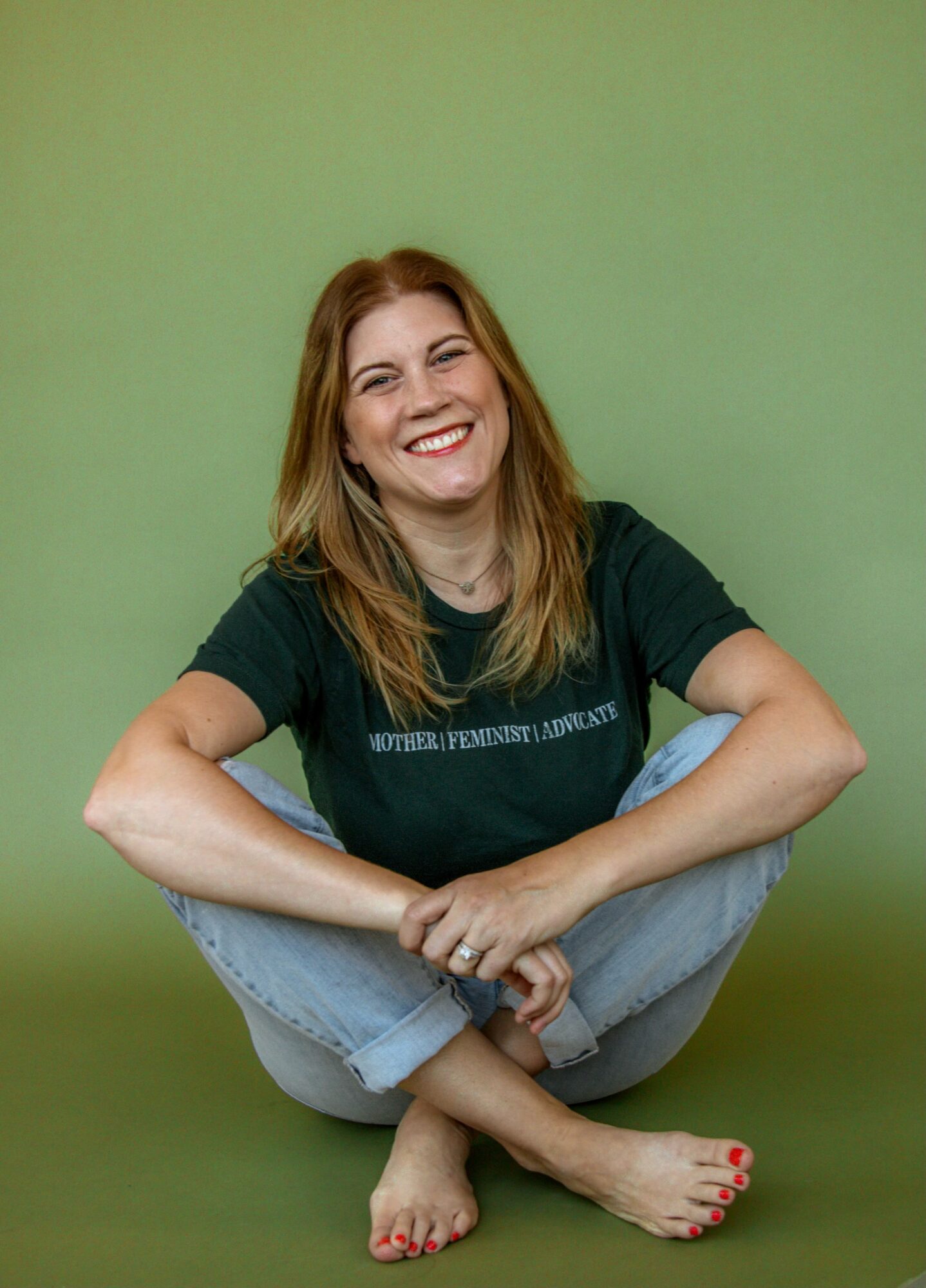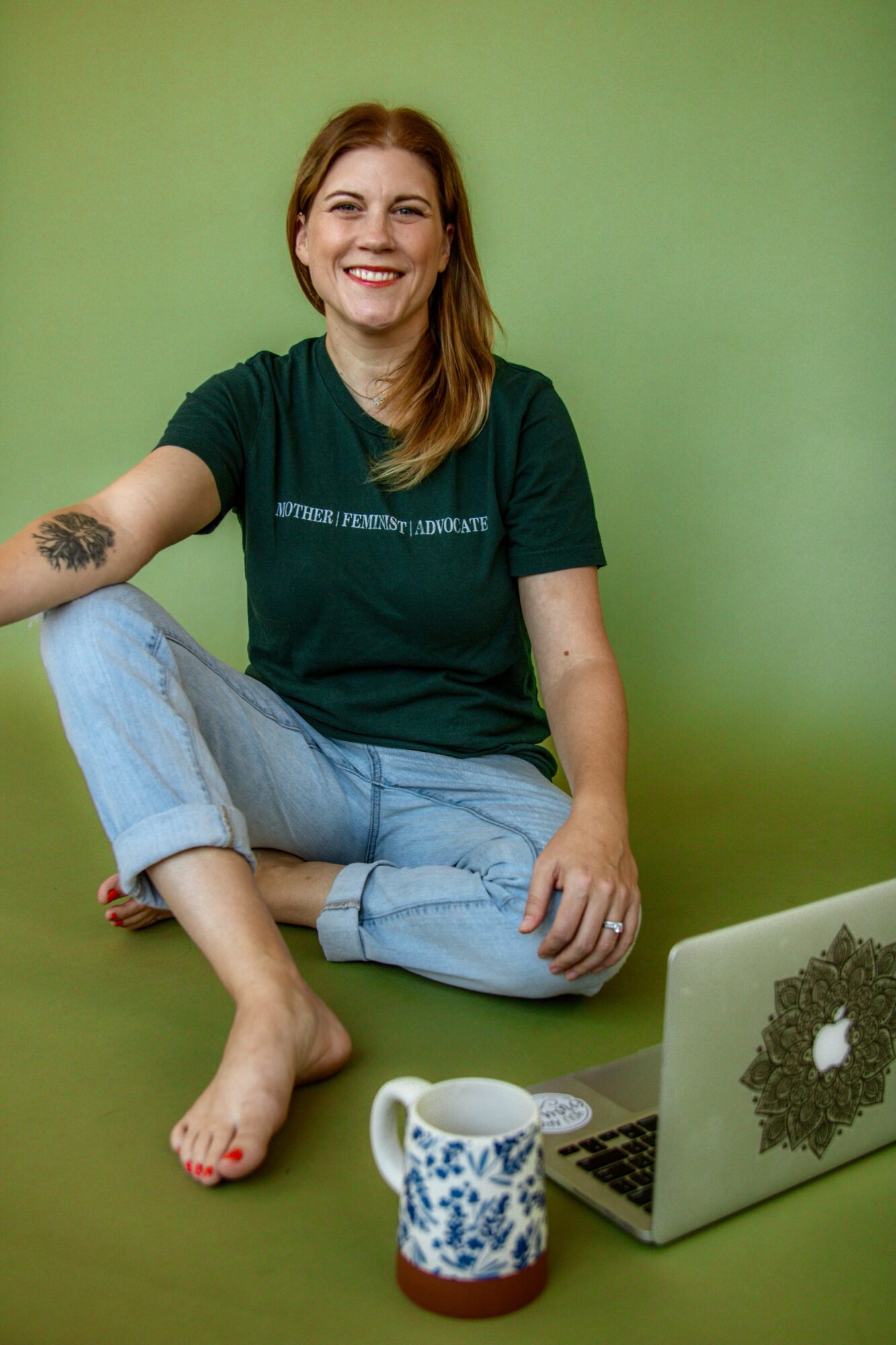

Today we’d like to introduce you to Amy Serafin.
Hi Amy, thanks for sharing your story with us. To start, you could tell our readers some of your backstory.
There are countless beginnings to my story. I could start from the beginning, the ’80s, but I only remember a little of that and doubt my family’s reliability in retelling the facts. I could launch from my adolescent occupation in sports – gymnastics, cross-country, and track – and how being a young student-athlete was the cause and the consequence of my perfectionism, self-chastisement, and need to perform to feel worthy of love and care. It also wouldn’t be wrong to start my story after college, when I moved from Michigan to San Francisco and discovered an assortment of skills in things like teaching sex-ed, mentoring under-resourced teens, hiking and climbing in tall mountains, and dating all the wrong people. All that said, I could be burying the lead if I don’t start more recently with my move to Texas, grad school, marriage, the birth of my motherhood, and the launch of my psychotherapy private practice. “My story” is nuanced, layered, emotional, mostly unconscious, and constantly evolving, and I view my work with clients in a very similar light.
When people ask why I became a mental health therapist, my honest answer is that I always wanted to be a counselor because I always wanted to go to counseling. I distinctly remember the little closet office of my elementary school counselor; I was obsessed with peaking in there and seeing all her toys and fidgets. Did I have some horrendous secret or trauma to confess? Nope. Not one I was conscious of. But I desperately wanted the attention! I told my parents and teachers I needed counseling throughout middle and high school but my plea was never taken seriously. I was jealous of peers who’s suffering was more obvious and attention grabbing. That sounds sick, but those kids got that extra one-on-one time with a compassionate adult, which sounded fantastic.
My first official experience in therapy was in college. Sadly, I was hit with an episode of major depression – the natural result of genetics, life adjustments, grief after several deaths close to me, and the chronic misattunement I’ve been alluding to. The counselor I saw had many of the same desktop toys and fidgets I spied on when I was younger, but I was disenchanted now. And the treatment I received felt as flat as my affect.
Over the next decade I was a therapy hopper, going from one therapist to the next, trying to find the right fit; I sought a mythical healer who would perfectly attune to me, fill me with praise, and define my worth. I had some therapists who were “meh” and others who were “good enough,” but I certainly never felt that “Ah ha! This person gets me. This person has the answers and cures for all these uncomfortable feelings! Peace at last, peace at last!” A whisper inside me often said, “You can do better than them!” I felt I could help someone else a thousand times better than I could help myself; in fact, I was conditioned to care about others’ needs more than my own. I assumed that if I could obtain enough knowledge to fix everything around me, I’d feel better, too. I finally bit the bullet in my 30’s and went to grad school at UT. I learned my ass off, trying to absorb every “theory of change” and practicing every therapeutic intervention I could in my internships. Unsurprisingly, I found satisfaction in working with adults with childhood traumas and strained family relationships. I received the necessary qualifications and experiences, but to my dismay, it did not eradicate my suffering.
At this point, it started to sink in that I was, after all, human. I recall feeling down once, and my sister-in-law snarkily saying, “You’re a therapist – shouldn’t you know how to get over these feelings?” *Ah hem.* Can doctors get sick? Can teachers learn? Can professional athletes fall down? But a therapist can’t have feelings… hmm…
This is the part of my story where self-compassion started sinking in. I shifted my perspective from being a “healer” to that of a “helper.” I realized that my pursuit of happiness was a journey, not a permanent destination. This cliche but radical reframe has challenged me to remove the delusion that therapists are wizards and that hard feelings (i.e., sadness, worry, fear, anger, shame, disgust) are not internal plagues that must be cured. From here, I stepped into a more modern analytic style of conducting therapy, focusing less on “fixes” and more on connection, understanding unconscious human conditioning, and fostering client agency and resiliency. It has taken years of supervision, training, consultation, and therapy to get comfortable with this approach to helping others, and it is, of course, a perpetual work in progress.
I would stop right there if I could. It’s a contented place. I wish I could say that everything – my career, family life, and health – got so delightfully easy after this shift. I’d love to report that starting my own therapy business was a breeze, and I am now a billionaire who gives it all back to charity. And best of all, I love all my hard-AF feelings now. But no. Plot twist: I had kids! Oh, wait, second plot twist: during a pandemic!
My identity as a mother has changed everything in my story. It has affected my priorities and values. Motherhood touches everything – my body, energy, time, disposable income, ability to regulate my nervous system, marriage, and my attachment system. My birthing experiences were traumatic and catapulted me into learning more about perinatal mental health, of course as a way to help myself through it, and because I now see the epidemic of emotionally under-supported birthing people. Because of my journey in parenthood, the strength of my empathy and understanding has multiplied for clients who are parents/caregivers now, have ever been children, or have ever had parents (so yeah, that’s everyone).
But my life as a mom, a therapist-mom, a “thera-mom” has demanded I do the work of “client” and “learner” in more intense ways than ever before. The challenges one faces as a parent are non-stop. For example, my young boys have special needs, so I am constantly running around to their therapies or mine, reading literature about their needs and trying new things to make life easier. The difficulties of this season of life, three years of a pandemic, and striving as an entrepreneur have taken a lot of self-reflection and help from my community. Being a thera-mom in 2023 is not for the faint of heart, and despite how much it sucks sometimes (err, every day, at least a little), this is my proudest moment.
I opened my private practice, Amy Serafin Counseling, LLC, in May of this year. My mission is to serve adults who are chronically stressed, anxious, lonely, highly sensitive, self-critical, and trying to over-function their way out of all their emotional problems (just the way I always did). I see individuals, couples, and groups. Many of my clients have realized they had adverse childhood experiences, including physically or emotionally absent/misattuned/too preoccupied parents. Many of my clients struggle to feel loved and experience chronic depression, anxiety, pain, sleep issues, and difficulties adjusting to change. I am passionate about helping others by authenticating their journeys with compassion, collaboration, humor, and cultural sensitivity. I deeply hope this personal snippet of my career and self-development helps someone feel seen and offers a glimpse of hope that they don’t have to endure their hardest feelings all alone.
Can you talk to us about the challenges and lessons you’ve learned? Looking back, would you say it’s been easy or smooth in retrospect?
For mental health clinicians, you are acutely aware of obstacles and challenges in your clients’ lives and your own. I can’t help but acknowledge the plethora of subtle hurdles that live in the fabric of existence, sometimes jumping out and stopping us in our tracks. Take the weather, for example. We have it every day and night, but sometimes it bums us out, makes us change our behavior/plans, or even acts as a catalyst to severe mental health afflictions (think about the emotional impact of our recent winter storms and heat spells). Humans and other living things have a biological system in place to pay close attention to obstacles and challenges, called a negativity bias, so we can more safely navigate a dangerous world and not get eaten by bears. In the Disney Pixar movie “Inside Out,” Fear and Disgust (characters) illustrate the importance of paying attention to life’s obstacles; the film introduces Disgust by saying, “She keeps [people] from being poisoned, physically and socially.” In my line of work, awareness of our obstacles is a matter of social and emotional survival.
I have confronted a few major obstacles in my journey to become a Licensed Professional Counselor and business owner. I’ve already named the challenges of having feelings, health issues, a complicated family system, and having kids, but there was a terrifying point in my career where I felt I met a dead end. There was a period after graduating with my master’s degree that I was not yet licensed because there’s a rule prohibiting application before you graduate. In 2017, the licensing board was months and months behind in approving applications. To make matters more complicated, some people who receive a counseling degree in Texas can go on to work in the industry before getting a provisional license, aka becoming a Licensed Professional Counselor Associate, which depends on where you work: working for schools and nonprofit agencies exempt you from being licensed before employment. I thought I had landed my dream job of working for an agency within a school system, and I was advised that I could start my career as a clinician before the board caught up to my LPC application. I worked this job for several months before I learned there was a particular nuance to the rule and my situation that put me in the wrong.
Devastatingly, one of my supervisors broke the news to me. She did this by reporting me directly to the board with an ethics complaint rather than speaking to me or attempting to amend the situation. As a result, I lost my employment and was forced to walk away from my clients.
Even though the ethics complaint was pending against me, the board did approve my license a month later. Legal counsel assured me I could restart my counseling career while the board took their time processing their backlog of files. I persisted as a therapist in the private practice sector – under supervision – for three long years before the board attended to the complaint filed against me. By then, I had accrued indisputable evidence that I was ethical, rule-abiding, more educated, and eager to serve the community. With that, the board dropped the complaint and confirmed no discipline was warranted. It was a dark cloud over my head for a long time, but ended with a silver lining. It ultimately did not stop me from obtaining my full licensure or starting my own company. While these obstacles were unnecessary and gave me doubts, I have to admit that they also made me a better person and therapist.
I appreciate you sharing that. What else should we know about what you do?
To put it in an over-sized nutshell, I am a cis, white, queer woman, mother, xennial, and Licensed Professional Counselor working to help folx understand their pasts and deepen their connections with others. Clients find me warm, flexible, humorous, authentic, and direct. Behind the scenes I am an analytical thinker, but I focus on building trust and safety in my clinical relationships so clients can dig deep into the feelings that drive them. Here’s the thing: I believe growth and change can occur gradually and gently, and all the more powerfully, when you can talk freely about your past and present experiences. I respect that therapy is vulnerable, so I don’t rush things. I will not short-change you with ineffective “quick fixes.” I will be committed to helping you understand your core beliefs so you can have more control over how you connect with others, behave, and feel in stressful situations. In psychology talk, I work from a modern psychoanalytic and attachment-focused perspective. In essence, my practice is about cultivating a safe enough relationship so that you can be authentic and take meaningful risks sharing your feelings. You can access your deepest ingrained behavioral patterns when you feel safe and connected with those callous feelings. From there, you can explore new ways of managing your problems and relating with yourself / others. I spend time with individuals, couples, and groups as they talk about their past and in-the-moment experiences. I don’t give out worksheets. You won’t find me following a script or rigid protocol. Despite my long-winded writing style, I don’t do most of the talking, but I’ll ask questions to help you feel seen, understood, and supported in making a change. When clients actively participate in this work, they uncover their self-worth and wisdom and can better manage their emotions, resolve conflicts, and guide themselves through future hardships.
Where do you see things going in the next 5-10 years?
The world is a fraught place these days. There is no shortage of trauma on the societal and global levels. Human suffering is inevitable. I sound dark and pessimistic, but I say these things with a genuine feeling of warmth and acceptance. People need helpers of all kinds, and I am privileged to be one. I also think the last few years have been especially taxing due to the pandemic, racism, gun violence, climate change, and political divisiveness, so baby, the business of counseling and therapy is a-boomin. I am perpetually excited to do this hard work. I feel hopeful that the general population is more invested in their mental health than ever before. I am curious to see how access to services changes in the future. Like the shortage of teachers and nurses, psychotherapists are in high demand but are not fairly compensated by insurance companies or agencies. This leaves clinicians burnt out and turning toward private-pay-only business operations to make a livable wage. The inflation in the Austin area and the metropolitan areas of Houston, Dallas, and San Antonio make it hard for both clients and therapists to meet their needs. I’m unsure what will resolve this except for a radical culture shift in prioritizing mental health. I see that shift moving slowly, glacially, but we’re far from the utopian dream of free counseling for all. For now, I’ll be happy with any professional counseling for all.
Pricing:
- Individual: $150/hour
- Couples: $185/75 min
- Groups: $50/90 mins
Contact Info:
- Website: http://www.amyserafincounseling.com
- Instagram: https://www.instagram.com/amyserafincounseling/
- Facebook: https://www.facebook.com/amyserafincounseling
- Linkedin: https://www.linkedin.com/in/amy-serafin-lpc/





Image Credits
Scarlett Rogers (High Pocket Photography), Amber Taylor (Amber Taylor Photography)













